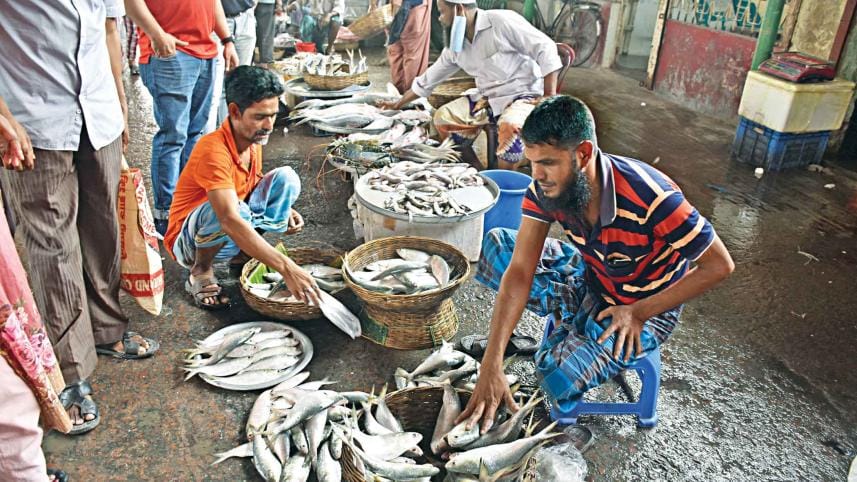Hilsa traders, fishermen in hot water

Fishermen and fish traders have found themselves in hot water as the ongoing nationwide pandemic restrictions have hampered sales ahead of Pahela Baishakh, the first day of the Bangla calendar.
The demand for panta-ilish (a combination of rice soaked in water overnight and hilsa fried, steamed or in curry form) tends to soar on the occasion of Pahela Baishakh, held on April 14, as it is traditionally enjoyed as a part of celebrations.
But in order to tame the recent surge in coronavirus cases across the country, the government announced a seven-day "lockdown" that began on Monday last week.
During this period, restrictions have been placed on public movement, transport and gatherings, making it difficult for people to visit their local markets or prepare for the country's biggest cultural festival.
During a visit to a hilsa wholesale market, it was seen that most traders were passing idle times while others had closed up shop altogether.
According to data from the Department of Fisheries office in Barisal, hilsa production has increased to 5.5 lakh tonnes this year from 3.6 lakhs tonnes in 2020.
More than 60 per cent of the country's hilsa production takes place in and around Barishal.
"There is a huge demand for hilsa fish during Pahela Baishakh but fishing at six hilsa sanctuaries was halted between March 1 and April 30 this year," said Anisur Rahman Talukder, deputy director of the Department of Fisheries' Barishal office.
And so, the supply of hilsa decreased as there were no fishing activities in most catching areas, including Meghna river, Arial Kha, Bishkhali and Ilisha of Barishal division.
At the same time, supply fell due to the ongoing Jatka Conservation Week.
"But the demand remains high at this time of year, when hilsa is sold for more than double the normal price, Talukder added.
At least 500 tonnes of hilsa from Barishal's largest wholesale market and another 500 tonnes from the Patharghata, Bhola and Kuakata hilsa wholesale hubs are sent to the country's metropolitan cities ahead of Pahela Baishakh each year.
"This year though, no hilsa has been shipped," said Nirab Hossain Tutul, president of Barishal's Matso Arotdar Samity, a platform of fish wholesalers.
The total value of hilsa supplied to Dhaka and other major cities during this time of year is usually around Tk 10-20 crore.
But since most markets are now closed or operating on a limited capacity due to a lack of customers, just 200 to 500 maunds of hilsa is being sent.
As a result, hundreds of traders, and fishermen have been affected, Tutul said.
Ujjal, a hilsa trader from Port Road in Barishal, said hilsa was previously sent in large quantities to hotels in Dhaka at a price of about Tk 2,000 per kilogramme (kg) for the Bangla New Year.
This time though, there is no stock of fish as there is no demand while transport has been suspended, he added.
Hilsa is currently sold for Tk 1,200 per kg but even with the reduced price, buyers are not turning up in adequate numbers.
Belal, a labourer at a hilsa wholesale market, said at least 2,000 of his peers are now sitting idle.
Intense monitoring in the country's hilsa sanctuaries also led to the drop in supply, said Bimal Chandra Das, the local fishery officer (hilsa) of Barishal.
Since March 1, more than 100 mobile drives have imposed fines totalling Tk 6.5 lakh for violating the ban on fishing at sanctuaries.
"They also arrested 316 fishermen for the act," Das said.



 For all latest news, follow The Daily Star's Google News channel.
For all latest news, follow The Daily Star's Google News channel.
Comments